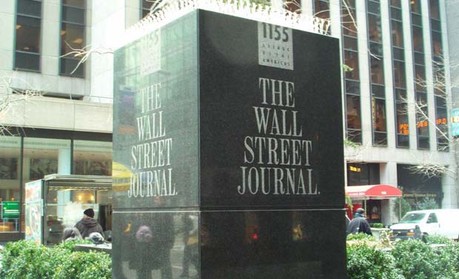
The Wall Street Journal has responded to accusations of a circulation scam, claiming they are 'replete with untruths and malign interpretations'
Credit: jfeuchter on Flickr. Some rights reserved.The European edition of Rupert Murdoch's Wall Street Journal has been accused of operating a complex circulation scam in which it secretly bought thousands of copies of its own newspaper at a knock-down rate in order to fool advertisers.
The alleged scam is reported to be behind the abrupt resignation on Tuesday of the most senior executive at the Journal's European edition, publisher Andrew Langhoff.
According to Dow Jones, which is owned by Murdoch's News Corp and in turn owns the Wall Street Journal company, Langhoff decided to step down after an internal investigation showed that two articles in the Wall Street Journal Europe featuring a company called Executive Learning Partnership (ELP) had been prompted by a business relationship between the company and the newspaper's circulation department.
In an internal memo sent to employees of Dow Jones, Langhoff said that as the person with executive oversight during the agreement with ELP and publication of the articles, the "honourable" thing would be for him to resign.
"Because the agreement could leave the impression that news coverage can be influenced by commercial relationships, as publisher with executive oversight, I believe that my resignation is now the most honorable course."
But the reason behind Langhoff's departure is now alleged to be the discovery of a complex scam designed to fool advertisers over circulation numbers.
The Guardian reports that the Journal has been secretly channeling funds through European companies in order to effectively purchase thousands of copies of its own newspaper at a massively reduced rate, leading to inflated circulation figures.
Dow Jones issued a statement last night in response to the allegations, claiming that the Guardian report was "inflammatory" and "replete with untruths and malign interpretations".
The publisher claims that the bulk sales agreements with ELP, while "admittedly complex", were "legitimate and appropriate" and certified by the UK's Audit Bureau of Circulation.
According to the Guardian, the Journal's "scam" began with a unorthodox circulation-boosting scheme called the "Future Leadership Institute". Under the scheme, European companies sponsored seminars for promising young university students by purchasing copies of the Journal at a knock-down rate of no more than 5¢ each. In return, the Journal published the company's names in the paper.
By 2010, the scheme was reportedly responsible for 41 per cent of the European edition's daily sales – 31,000 copies out of a total of 75,000.
But according to the Guardian, ELP, which was responsible for purchasing around 16 per cent of the European edition's circulation – 12,000 copies a day – at just 1¢ each, threatened to pull out of the deal, unhappy with the level of publicity it was receiving in return for its investment.
Langhoff then allegedly altered the contract with ELP, adding that the Journal would publish "a minimum of three special reports" featuring survey's conducted by the company.
On a second occasion when ELP threatened to pull out of the deal, the Journal allegedly paid the company for its bulk purchases of the paper.
The Guardian also reports that former Dow Jones senior executive Les Hinton, who resigned from the company earlier this year over the phone-hacking scandal, was told about the irregular agreements by an internal whistleblower. Hinton reportedly decided to take no action over the scam and the whistleblower was made redundant.
Dow Jones claims that the Guardian "mischaracterises" its former employee as a whistleblower, adding that the employee in question was first investigated by the company because of concerns over his business dealings.
The publisher maintains that Langhoff resigned over a "perceived breach of editorial integrity, not because of circulation programs", and says the complex circulation agreements were "legitimate and appropriate".
Free daily newsletter
If you like our news and feature articles, you can sign up to receive our free daily (Mon-Fri) email newsletter (mobile friendly).
Related articles
- The Wall Street Journal launches archived content newsletter
- From problem solver to innovator: how bridge roles have evolved in newsrooms
- DCMS-backed media literacy programme is supporting vulnerable internet users
- Robin Kwong, new formats editor of The Wall Street Journal, on evolving bridge roles
- Tip: Lessons from the Guardian's membership model











